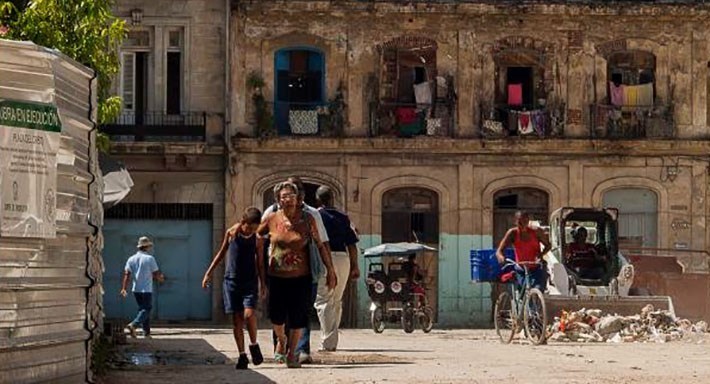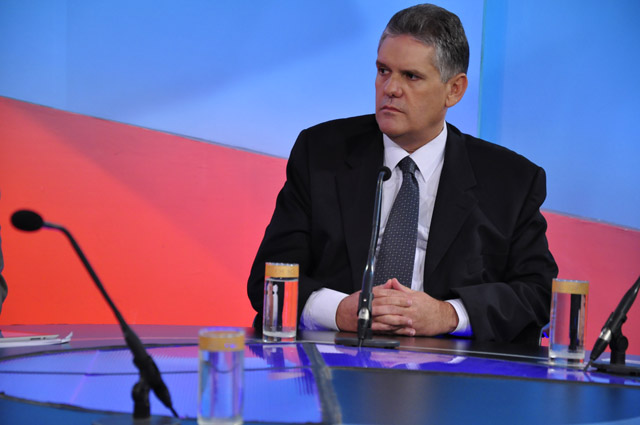 Photo from the Viajero Anónimo Studio blog.
Photo from the Viajero Anónimo Studio blog.
Cuba’s Minister of the Economy describes the economic crisis
HAVANA – The Cuban Minister of the Economy, Alejandro Gil, last week presented “a synthesis of the progress of the National Plan for Economic and Social Development of the country until the year 2030” to the National Assembly of Popular Power (ANPP). Most relevant in the findings, as reported by the recently appointed minister, is that this year Cuba will not meet the level of planned exports, and that there have been delays in payment to suppliers, which will affect credit that the country needs. The level of uncertainty is high; however, he added, the GDP growth projected for 2019 is still possible.
According to Gil, “we are facing a complex national and international situation impacting the economic situation in the country. Under these conditions, progress has been made” on this plan. To this end, a steering group was established, as well as a coordinating group and nine working groups, and a macroeconomic team in charge of “elaborating projections that guarantee coherence and long-term equilibria.”
Objectives under the actual conditions
The National Economic and Social Development Plan (PNDES) for 2030 includes an evolution of the economy in three stages: from 2019 to 2021; from 2022 to 2026; and from 2027 to 2030.
“The priority is to focus on the first stage. For this, six strategic sectors have been identified, which generate a greater impact on the economy,” said Gil, adding that “great effort and resources will be prioritized without neglecting the rest. The development of these sectors, based on their characteristics and potential, projects growth in exports and national production, generating foreign exchange dollars and necessary synergies with the rest of the economic actors.”
These sectors are:
- Tourism
- Biotechnology and pharmaceutical industry
- Electro-energy sector, with special attention to renewable energy sources
- Food production
- Professional services abroad
- Construction
The increase in exports from these sectors represents more than 90 percent of the total increase of the country’s exports projected for 2030 “corresponding to the most significant contributions to tourism, the pharmaceutical sector, food, and agroindustrial sectors.”
Regarding infrastructure, Minister Gil announced that the country will focus primarily on three elements: telecommunications and information technology, transportation and logistics, and hydraulic and sanitary networks. The objective is to “shorten the existing gaps (…), and overcome the current level of decapitalization with an expansion and modernization of systems and technology.” These objectives also include, he said, the use “of talent and the formation of human capital that we have in the country.”
Here he referred to the demographic dynamics in the country in regards to a labor force reduction in the future. But the constant migratory pattern, mostly made up of young people –especially women– added to the chronic aging of the population and a very low birth rate, which could hinder the greater utilization of the human talent developed in Cuba mentioned by Gil. In response to this situation, he explained that “everything we do in terms of investment has to have a high technological component that allows us to do more with less.”
Some obstacles identified by Alejandro Gil before the ANPP

- [Leaders] not accustomed to working under systems of medium- and long-term planning. And the need to respect “macroeconomic balances, which we are not slaves to, but must be taken into account.”
- Strong financial restrictions. There are currently “arrears in payments of some debts that prevent the proper functioning of the economy, and the securing of credit foreseen in the plan.”
- The high level of imports foreseen in this year’s economic plan is based on supplier credits, which “are affected if you are not up-to-date in your debt payments with those suppliers.” Logically, no new loans are granted if we have not managed to pay for those that have already been granted.
- Foreign investment levels needed by the economy are not being met.
- Investments made have not been able to cushion economic performance on their own. “When we ask for external financing to invest in the country, in a factory, in an industry, in any productive sector, we do it on the basis that this investment generates other exports, or the substitution of imports; in other words, savings, or levels of activity that allow us to pay back debt based on returns from the investment.”
- “The inefficient use of energy carriers persists, and expected imports may not arrive for lack of credit, due in part to arrears in debt payments,” he explained. For that reason, “under current economic conditions, entities whose plan contain import expectations cannot be assured that these imports will be received.”
- There is a “shortage of fertilizers and pesticides for agriculture, lack of financing in foreign currency to support the demand presented by the differing organisms. In some cases financing has been made possible, which includes generating electricity, industry’s main commitments and the productive sector in general.” So far all components that comprise this year’s economic plan have yet to be met.
- The U.S. blockade against Cuba has been tightened with “the aim of suffocating our economy.”
The minister insisted that despite the national and international scenario presented, the high degree of uncertainty facing the country, and the fact that the economy has not reached its foreign investment goals projected for the first quarter of 2019, “we still expect to reach levels of activity foreseen in the economic plan, and growth of the GDP, even without that foreseen investment. And the only way to achieve this is by exploiting, to the maximum, our possibilities internally.”
We have not “renounced complying with the export plan this year,” he said, adding, “we believe that the first quarter delays can be made up.”
During his speech he explained that “exploiting internal possibilities” connotes a set of actions that Cuba has considered for years without taking action. They include the increase of national production, an increase of exports, replacing imports, not spending more than you have, diversifying exports, etc.
“During the course of this year, there has been a shortage of essential products for the people, both in the many stores and markets. This is an issue that is obviously impacting the population during these first months of the year, and as explained here last Wednesday by [Raúl Castro], we have to prepare ourselves to face a situation that may get worse in the coming months from the tightening of measures,” said Gil.
Next steps, according to the Minister:
- Find solutions internally to support our population’s needs. And here, when we say nationals, we are talking about inside the national territory (…), it is what we mean here, and should not create confusion in that sense (…). Find the solutions needed to face the levels of activity that the country demands without depending on imports.
- What we cannot produce because of our limitations, will partly be imported; but everything we can produce internally, above and beyond what we produce today, must be done in order to reduce a dependency on imports.
- We are (…), in the Ministry of Economy and Planning, working on a policy that enhances more local development projects, but we have to find solutions to all areas, and identify all the possibilities we have to push forward local development projects.
- Working on specific incentive proposals to increase exports is a priority for the country; we have to export more (…). When we visit the different areas of the country and compare what is exported today with what was previously exported, we exported more before, if not in quantity, at least in the diversity of products.
- Prioritize productive links with tourism activities, the Mariel special development zone, and the sale to cruise ships. In these areas we have already taken financial measures and other steps that need implementation. They are essential.
- Review entities that have approved currency financing schemes with imports, and prioritize them to essential levels, even reduce the retention coefficients in order to achieve a higher level of contribution to the central financing account in such a way as to prioritize the most important payments, and within it the debts, especially with prioritized countries.
- Incorporate into the economic plan all investments that generate a higher production of food, extraction and production of oil and gas, and renewable energy sources, bearing in mind that this year more than $5 billion in food and fuel are being imported.
“Today we face the current situation with greater strength,” stressed the Cuban minister, concluding:
“We are developing tourism activity and its hotel infrastructure, as well as the potentially powerful biotechnology industry; we have diversified exports; we have grown our construction capacity, our hydraulic networks, as well as transportation and communications; we continue to advance in the strategy of society’s information technology; and we have the potential to substitute fundamental imports, mainly in food and fuels, among others no less important.
“These elements and many others not mentioned allow us to assert that we will continue working with firm steps forward in the confrontation and solution to present and future adversities.”


